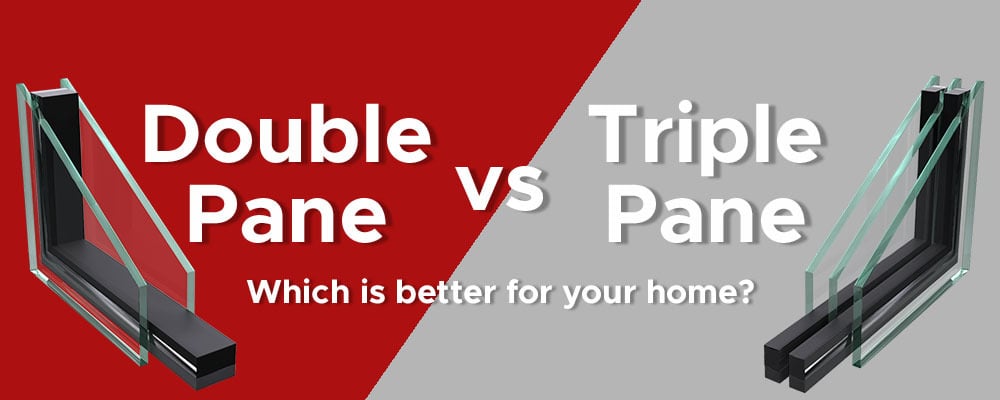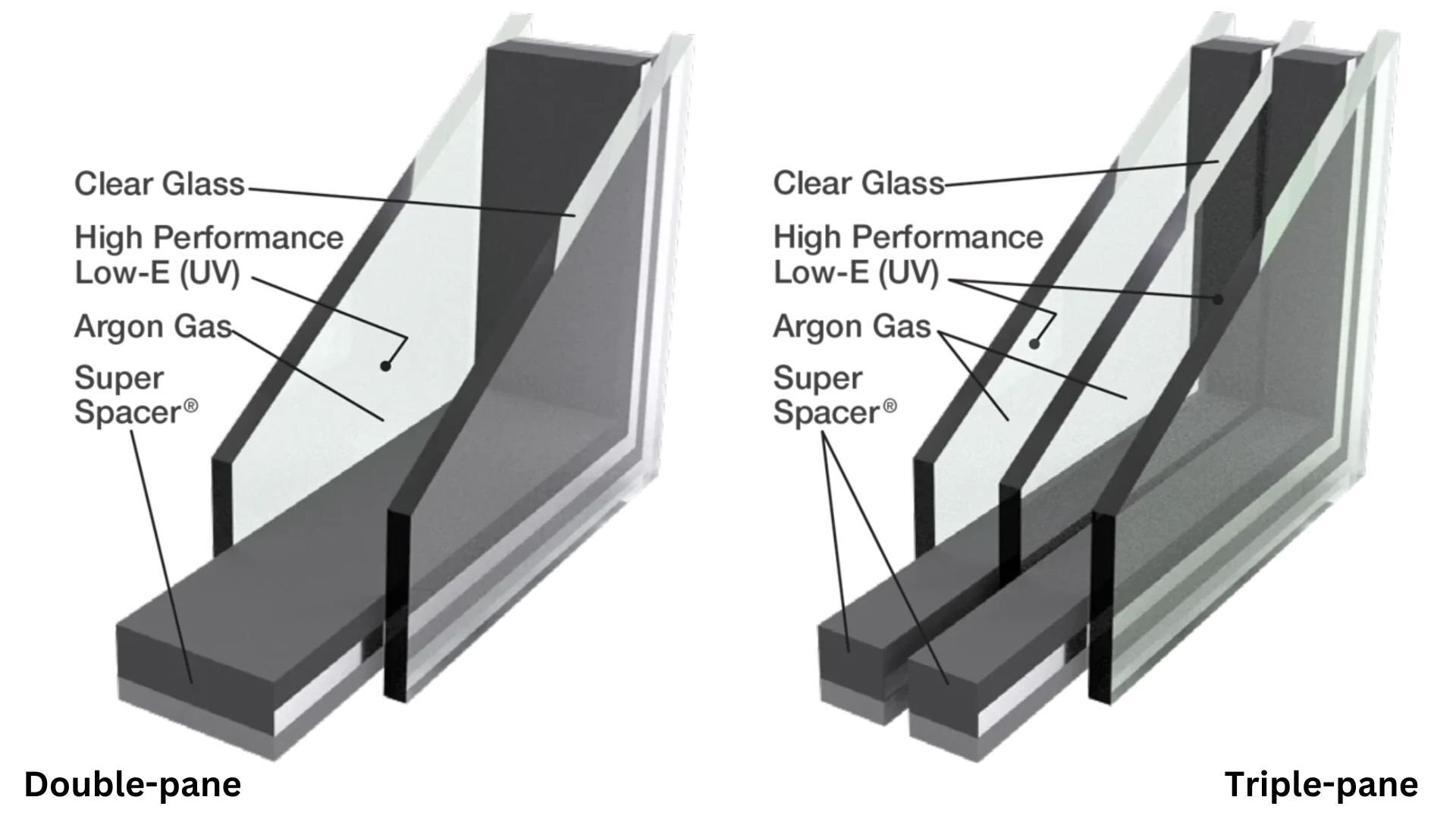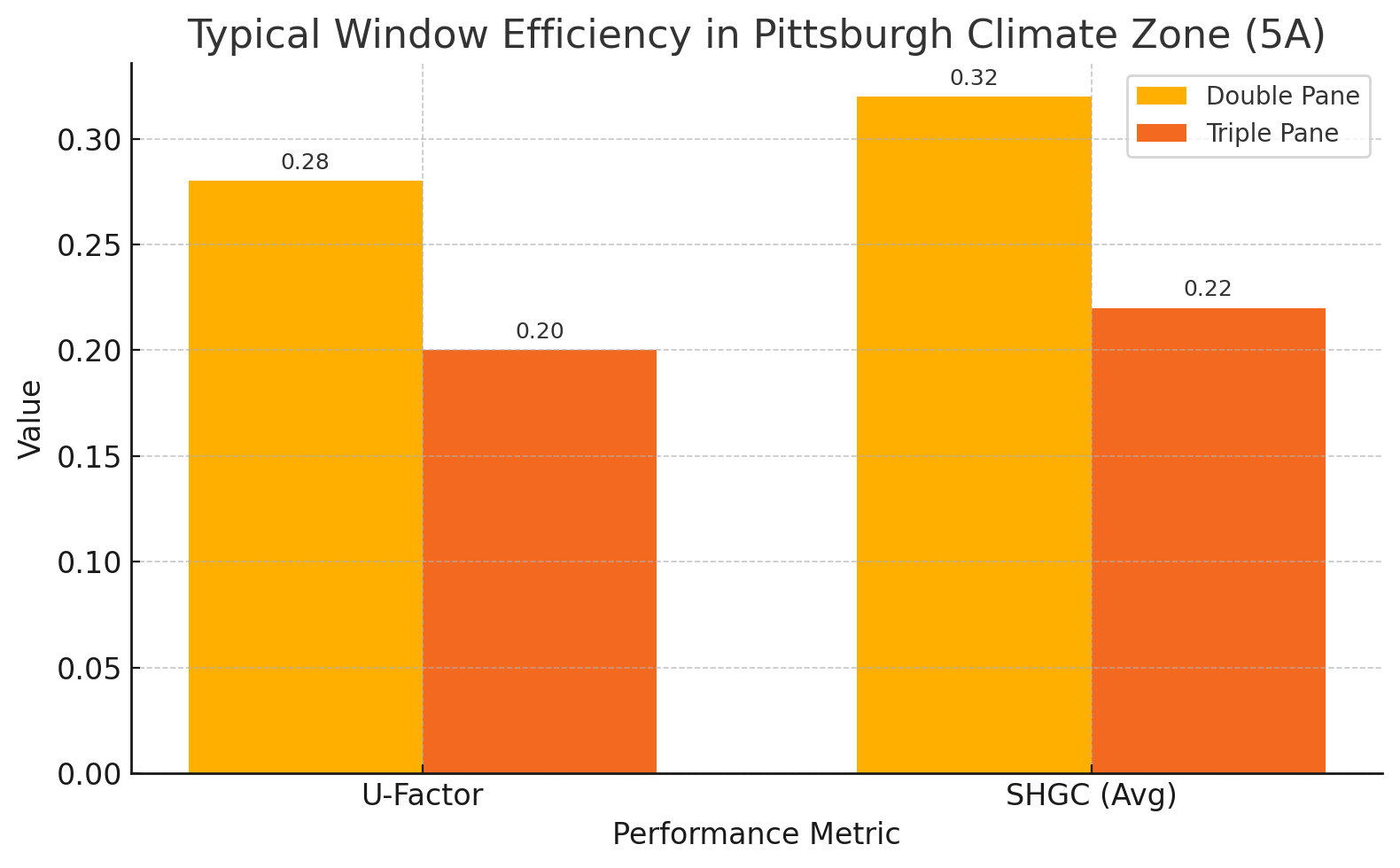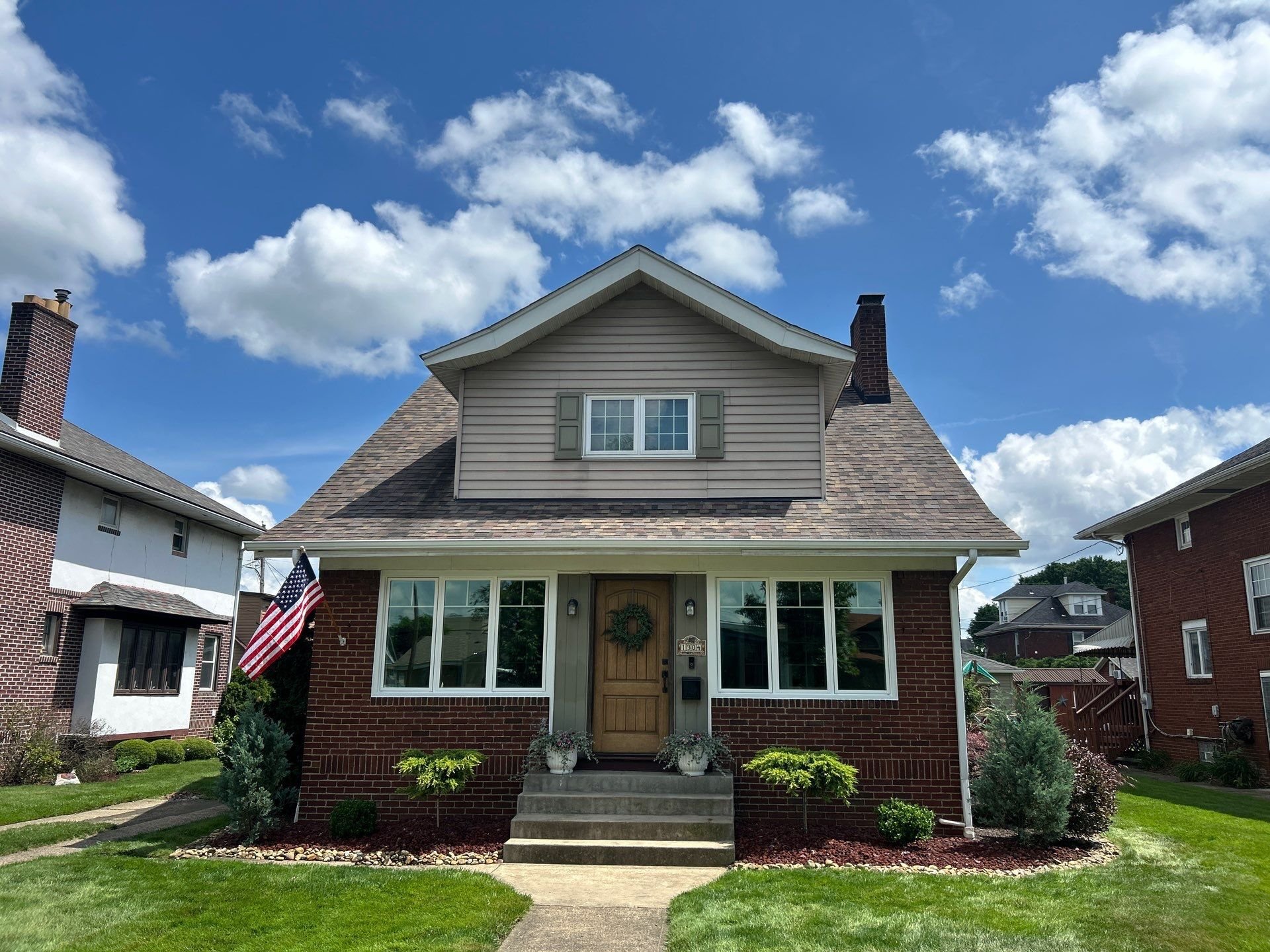Double vs Triple Pane Windows: What Pittsburgh Homeowners Should Know
July 9th, 2025
6 min read

With so many other factors affecting a window’s energy efficiency, is it really worth upgrading to triple-pane windows in Pittsburgh, or will you barely notice the difference?
With cold, drafty winters, humid summers, and constant noise from traffic or construction, how do you know which type of window will actually improve your comfort and energy bills?
In this article, you'll get a straightforward comparison of double vs triple pane windows, including cost, insulation performance, soundproofing, durability, and when each makes the most sense.
We’ve helped hundreds of homeowners across the Pittsburgh region upgrade their windows for year-round comfort, lower energy costs, and a quieter home. By the end of this article, you’ll know which option is best for your budget, climate, and long-term goals.

What’s the Difference Between Double and Triple Pane Windows?
Double-pane windows have two panes of glass; triple-pane windows have three. Simple enough.
Let’s compare the key features side by side:
| Feature | Double Pane | Triple Pane |
|---|---|---|
| Number of Glass Layers | 2 panes | 3 panes |
| Insulating Chambers | 1 sealed chamber | 2 sealed chambers |
| Gas Fill Options | Usually argon | Argon or krypton |
| Low-E Coating | Typically 1 surface | Usually 2 surfaces |
| Noise Reduction | Good | Better |
| Weight | Lighter | Slightly heavier |
| Cost | Lower | Slightly higher (typically $90–$150 more) |
Despite these few differences, it’s what’s in between those panes that matters. That’s where insulated glass units (IGUs) come in.

What Is an Insulated Glass Unit (IGU) and How Does It Improve Efficiency?
Each glass pane is separated by a spacer and sealed to form an insulated glass unit (IGU). Inside those cavities is usually a non-toxic, low-conductivity, inert gas like argon or krypton—creating a "dead air" space that slows down heat and sound transfer.
Around the edges of the glass unit is a foam or metal spacer that keeps the panes separated. A variety of edge sealing materials are intended to keep the gas trapped inside the space.
Low-E (low emissivity) coatings are often added to reflect heat back into your home during winter and block it in the summer.
Low-E coating is a thin, transparent layer of metal applied to the glass surface to improve efficiency by controlling how heat and ultraviolet (UV) rays pass through the glass.
Think of Low-E as a "heat mirror", reflecting heat out in the summertime and back into your home in the wintertime. It not only lowers energy bills, it makes your home more comfortable while providing UV protection that reduces sun damage to the interior of your home.
Think of it like a Yeti cup: the insulated space between the metal inside and outside of the cup keeps the liquid cold (or hot) and the outside from sweating. Your windows work similarly, just with glass.
Are Triple Pane Windows More Energy Efficient than Double Pane?
Yes, especially in cold and humid climates like Pittsburgh. Energy efficiency is where the extra layer of glass and low-E coating in triple pane windows can really shine.
The key differences come down to two performance metrics:
- U-Factor measures how well a window prevents heat from escaping. Lower is better.
- Solar Heat Gain Coefficient (SHGC) measures the percent of the sun’s heat that passes through the glass. Again, lower is better if you want to keep the sun’s heat out of your home.
In four-season, cooler climates like Pittsburgh, U-factors are more important to consider than SHGC. In comparison, SHGC is more important in hot climates like Arizona or Texas.

Working with the best replacement window companies in Pittsburgh is key to maximizing the energy efficiency of your new windows. A great window can be ineffective if installed poorly.
Do Double and Triple Pane Windows Qualify for ENERGY STAR and Tax Credits?
While many of today’s windows are very energy efficient, not every window is considered ENERGY STAR certified.
- Most triple-pane windows qualify for ENERGY STAR® certification and federal energy tax credits
- The tax credit is 30% of the cost of qualifying windows, with a maximum credit of $600 per year for windows.
- Most double-pane windows only meet basic ENERGY STAR standards, making it more difficult for them to reach “Most Efficient” criteria required for the tax credit.
While actual savings vary, a well-installed ENERGY STAR certified window can lower a household's energy bill up to 13%, according to EnergyStar.gov.
YOU CAN CLAIM:
30% of product costs
up to $600 maximim amount credited
Watch the video below to see the difference in glass package options on energy efficiency.
Are Triple-Pane Windows More Expensive Than Double-Pane?
They are, but only marginally.
Triple pane windows cost $90–$150 more per window (or $45–$70 per sash) than double pane.
But beware: Pittsburgh homeowners tell us some contractors charge hundreds more, but that markup isn’t justified.
What’s the Long-Term ROI of Energy-Efficient Window Upgrades?
Replacing your windows boasts an impressive ROI in terms of home improvement projects. According to Zillow, quality vinyl window replacement recoups about 68% of the investment, with wood windows following behind at 61.2%, respectively.
- Long-Term Home: The energy savings and comfort improvements will typically outweigh the upfront cost.
- Short-Term Home: If you plan on moving, consider whether or not it really makes financial sense to move forward with that project. Maybe lower-cost upgrades make more sense if you are looking for a quicker return on your investment.
Tip: Spacing out a window project over multiple years can let you claim the tax credit more than once. This allows long-term residents to benefit even more when replacing windows.

Do Triple-Pane Windows Reduce Noise Better Than Double-Pane?
Absolutely. Triple-pane windows offer better soundproofing than double-pane. Thanks to the extra layer of glass and dead air space, it reduces sound waves from traffic, barking dogs, or noisy neighbors more effectively.
Triple pane windows have a Sound Transmission Class (STC) rating between 28-34, while double pane windows hit 26-32, as stated on ngwindows.com. The higher the rating, the more soundproof it is, with a maximum being 38.
Who benefits most?
- Homes near highways or train tracks
- Homes in dense urban neighborhoods
- Bedrooms, nurseries, or home offices (where sleep or concentration are important!)
- Anyone craving peace and quiet
"It’s too quiet now—I can’t even hear the trains I used to fall asleep to," one Pittsburgh homeowner told us after her upgrade.

Are Triple Pane Windows Stronger or More Durable Than Double Pane?
Yes, but the difference is nuanced.
- Triple pane windows include more layers which makes them stronger overall.
- However, installation quality matters more than glass count. Even the best windows can fail if improperly measured or installed.
Are There Any Drawbacks to Triple Pane Windows?
Let’s address the common concerns that many Pittsburgh homeowners ask:
- Added weight? Slightly. Most homeowners won’t notice a difference when tilting in sashes for cleaning.
- Installation complexity? Not really. It doesn’t change the installation process for a window.
- Higher upfront cost? Yes, but usually marginal if priced fairly.
- Triple pane windows may have a slightly greater risk of seal failure due to more seams if installed improperly
Bottom line: the value outweighs these small drawbacks, especially in climates like ours.
What Are the Risks of Not Replacing Old, Inefficient Windows?
According to the U.S. Department of Energy, heat gain and heat loss through windows can account for 25–30% of home heating and cooling energy use. So while window replacement might not be the flashiest project on your to-do list, it can have a huge impact.
We get it, it's easy to push it down the priority list. But putting it off for too long can quietly chip away at your comfort, energy bills, and even your peace of mind.
Here’s what we often hear (and see) from Pittsburgh homeowners who wait too long:
- Higher Energy Bills: Drafty windows force your HVAC system to work overtime, especially in our freezing winters and muggy summers.
- Hot and Cold Spots: You might find yourself avoiding entire rooms because they’re just not comfortable year-round.
- Condensation Buildup: If you notice fogging or moisture between panes, your window seals are likely failing.
- Unsure if you should just replace or repair a foggy window? Read our guide on windows with condensation so you know what you’re up against.
- More Outside Noise: Old windows aren’t great at keeping the world outside where it belongs. Sometimes peace and quiet is all you want.
- Missed Incentives: Energy-efficient upgrades can come with federal tax credits, but only if you act before the deadline.
If your windows are 15–20+ years old, or your energy bills keep creeping up, it may be time to stop patching and start planning.
When Should You Choose a Double Pane Instead?
In most cases, triple pane windows are worth the upgrade because of their increased energy efficiency. But in some cases, a hybrid approach makes sense.
An example of a hybrid approach would be:
- Triple pane windows in bedrooms, offices, or street-facing rooms
- And double pane windows for spaces where insulation isn’t critical, like in a garage or attic
Pro tip: You can still improve double pane performance with Low-E coatings and Argon gas fill.
When Should You Choose Triple Pane Windows for Your Home?
If any of these apply, triple pane is a wise investment:
- You live in a varying four-season climate like Pittsburgh
- You plan to stay put for a while
- You want your home to be quieter, more efficient, and more comfortable
- You want to qualify for the Federal Tax Credit
Even in older homes, upgrading to triple pane can be a good first step toward improved energy performance.
What Else Should You Consider Beyond Glass Panes?
There’s more to a great window than just the glass:
- Frame material: Vinyl is maintenance-free; wood looks great but needs upkeep; fiberglass is strong but pricier.
- Installation quality: Even the best window fails if installed poorly.
- Whole window performance: Look at the window as a complete system—frame, glass, seals, and hardware.
Want to understand warranties and what's actually covered? Check out our homeowner's guide to window warranties.
Should You Choose Double or Triple Pane Windows for Your Pittsburgh Home?
Old or underperforming windows aren’t just an eyesore; they can quietly drive up your energy bills, make your home feel drafty or noisy, and leave you frustrated, especially in Pittsburgh’s unpredictable weather.
We’ve worked with hundreds of local homeowners facing these exact challenges. From triple-pane upgrades in century-old homes to budget-conscious fixes with double pane options, we understand what works, and what doesn’t for homes in Western Pennsylvania.
You don’t have to make this decision alone. Use our Window Pricing Calculator to get a sense of costs, or reach out for a no-pressure conversation. Whether you go double or triple pane, the right window upgrade can transform your comfort, energy efficiency, and peace of mind starting now.

Frequently Asked Questions
-
Do triple pane windows help with condensation?
Yes, they keep interior glass warmer, reducing the risk of condensation.
-
Is it worth replacing windows before selling a home?
Only if your windows are in poor condition or hurting curb appeal. Otherwise, simpler upgrades may yield better ROI.
-
What is the average cost to replace 10 windows in Pittsburgh?
Depending on style and features, you might expect $15,000–$25,000.
